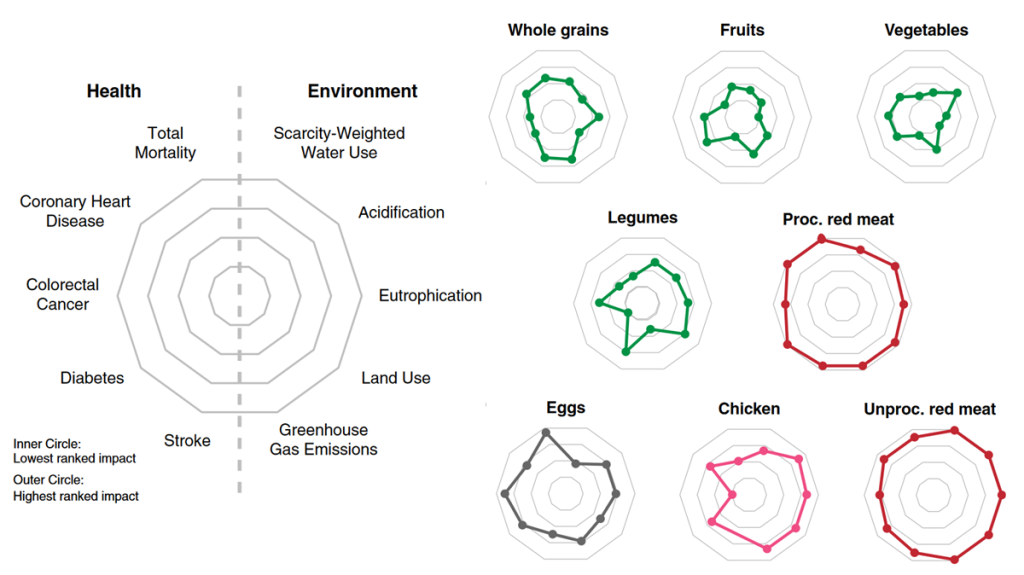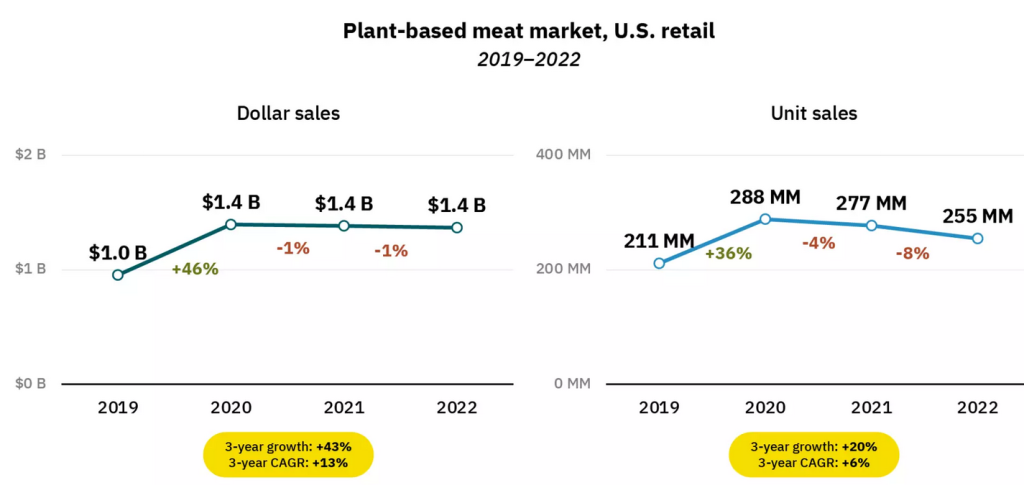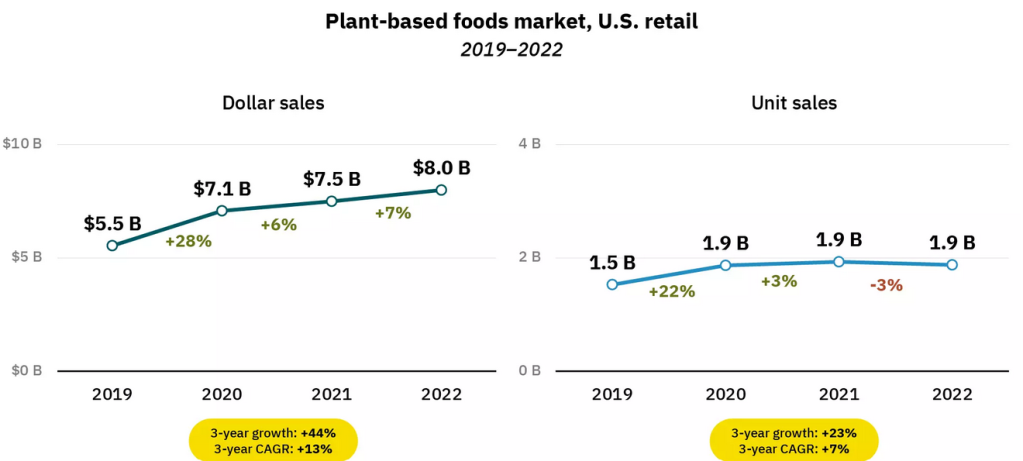Sales of plant-based meat substitutes are stagnating in the US – in fact they have been dropping since 2020. Here’s some data from the Good Food Institute showing the trend in terms of both dollar income and unit sales:
The graph below shows that sales of plant-based foods in general have also slowed down, although not nearly as much as the specific plant-based meat segment.
Let’s take a look at why this is happening. I’ll take the example of Beyond Meat because I’ve followed the company over the years and like their products, both in terms of taste and ethics. In a previous post looking at the sustainability of Beyond Meat I rated the company 5/5 Green Stars for social and environmental impact. Sure, there is some room for improvement, but I think it’s in the top 10%. On my sister site, Ethical Bargains, I wrote about specific Beyond Meat products – Beyond Burger, Beyond Sausage and Beyond Chicken.
Why is Beyond Meat struggling?
Beyond Meat has struggled along with the general plant-based food market. When I first wrote about Beyond Meat in 2019, plant-based meat sales had risen 24% (and more than that in Europe) while sales of regular meat had risen only 2%. I had hoped to buy shares at the IPO price of $25 and then felt that I had missed the boat as the share price quickly rose to over $200. Now, four years later, the share price is languishing below $12. What happened?
The first explanation that you might think of is that the combined impact of Covid-19 and Trump-20 wore everyone down to the point where they couldn’t deal with any more – especially in the US. That is to say, we had little energy left to deal with challenges like switching to plant-based meat and so we went back to familiar comfort foods.
That sounds plausible and it could certainly be a contributing factor. But there’s also something else going on that specifically hit plant-based meats hard – health concerns. Specifically, you may have noticed the sudden appearance of articles about it in your news feed about the perils of ultraprocessed food.
The image above shows a comment on Beyond Meat’s Q2 2023 earnings on the investment site Seeking Alpha. Comments like this one are very common on articles about plant-based food companies, particularly on investment sites. Some of these comments are almost certainly from people with skin in the game (more on competitive marketing tactics in a moment) but for others this kind of bravado is a way to reduce cognitive dissonance.
A major source of cognitive dissonance is the “meat-paradox” – the fact that most people who eat meat also find animal suffering offensive. Buying into “health concerns,” no matter how spurious, offers a justification to dismiss plant-based meat, reduce cognitive dissonance and continue on as normal.
CEO Ethan Brown on Beyond Meat’s revenue decline
It’s not just my opinion that the decline of plant-based meat in the US is largely driven by health concerns. Let’s see what Beyond Meat CEO Ethan Brown says about it on the latest earnings conference call (Q2, 2023). He talks about the significance of plant-based meat in mitigating climate change and then says:
So Europe understands that. The consumer is getting that – young people are getting it in Europe and here in the U.S. it’s more driven by health, and there’s been a decline in the health perception of our category.
[The Food Marketing Institute] noted 50% of consumers in 2020 thought that plant-based foods were healthy and now that number is down at 38%.* That’s a clear outcome of some competitive marketing done against us, and they’ve done a really good job at it. Done a very impressive job in changing the consumer perception.
*Here’s a link to the report with that statistic.
Competitive marketing – I guess that’s a nice way of putting it.
Health concerns over “ultra-processed” foods
In response to the Beyond Meat quarterly report, articles popped up with headlines like this one from Tasting Table:
Beyond Meat sales plummet 30% as consumers question ingredients
“Questions are being raised about the vegan meat alternative, particularly its ingredients and the amount of processing that goes into the patties and sausages.”
Is it really the consumers who started questioning ingredients? I think it’s much more likely that consumers were influenced by the articles that started popping up in their news feeds. This has certainly been my experience. Let’s take a look at the actual science.
A recent NPR article on ultra-processed foods centers on research led by Dr. Kevin Hall, a senior researcher at the National Institutes of Health (NIH). Hall and colleagues carried out a study where “20 inpatient adults received ultra-processed and unprocessed diets for 14 days” and were then examined. The diets were matched for macronutrients (protein, fat, etc.) but the patients were allowed to eat as much food as they wanted. The main finding of the research was that the adults on the ultra-processed diet ate around 500 calories per day more than those on the unprocessed diet.
This makes sense to me – I’m more likely to overindulge on foods like cookies or potato chips than apples or quinoa salad, and I’m pretty sure I’m not alone. Recommended serving sizes on processed food are usually ignored and/or exceeded in my experience. In a previous post on processed food, I discussed how snacks like Coke and Doritos are formulated to be a) craveable, and b) consumed in large quantities. All of this applies more to snacks than to items like a veggie burger, where I’ve never turned around to cook a second one after eating the first.
The NIH findings shouldn’t come as a surprise – we pretty much all know that a diet composed entirely of processed food with no fresh fruit and veggies is not a good idea. So, if you were to say to me that a plant-based burger is less healthy than a plate of steamed organic spinach, I’d say: sure that’s generally true. But this kind of research on processed food cannot be invoked to claim that a veggie burger is generally less healthy than a beef burger, because that is simply untrue. It’s a subtle twist of logic (or bait-and-switch, if you like) that’s easy to miss.
Unfortunately these tactics often work quite well for industry groups that employ them with no scruples.
Smoke and mirrors
I’ve previously written about The Merchants of Doubt, a book (and documentary) that exposes the tactics used by industries with a bad reputation. The approach used by these industries is to cast doubt on data that the product is harmful in some way, changing the public perception and buying the industry more time to continue as normal. The most obvious examples here are the oil and tobacco industries but it applies to any group with something to lose. The Pulitzer-nominated journalism behind the Merchants of Doubt focuses on flame retardants:
The story of an “expert” who testified for the necessity of flame retardant chemicals in furniture is fascinating. When confronted by the journalists who told him that they knew his story (helpless baby, candle, pillow containing no flame retardants… you get the picture) was actually not true, he brazenly said that it was an allegorical story (!) and then added that he wasn’t under oath. – GSP post on The Merchants of Doubt
The story of the campaign against plant-based foods has been similar, ranging from ads (Remember Aubrey Plaza’s Wood Milk?), “informative” websites/articles and influencer posts.
The biggest player has been the Center for Consumer Freedom (CCF), run by the Washington lobbyist who served as the inspiration for the film “Thank You For Smoking,” and who has also fought against the Humane Society and raising the minimum wage. – Tasting Table
The industry groups can even worse than individual corporations, some of which are making positive changes. I previously wrote about vegan companies being harassed by established animal-based food corporations and industry groups. In one example, members of the American Egg Board emailed about putting a hit on the CEO of Eat Just (which makes a vegan egg substitute). No worries though – they were only joking : /
Also see my post on the Paleo Diet, another construct that the meat industry has leveraged to encourage people to remain on animal-based diets. The author has previously been funded by the beef industry, and his information behind his recommendation to avoid legumes (the main ingredient in most plant-based foods) is so erroneous that I wrote a post addressing each claim.
A plant-based diet is healthier than an animal-based diet
When we think about plant-based diets and ultra-processed foods, it’s important to examine the facts so that we don’t fall prey to the merchants of doubt. I’ll refer you to a post on the scientific evidence that animal-based (high animal protein, low carb) diets shorten the human lifespan. This is well established.
Take a look at the graphic below, adapted from a 2019 paper, Multiple health and environmental impacts of foods, published in PNAS (one of the highest quality scientific journals) by researchers from the Universities of Oxford, Minnesota, and California. These radar plots show the impact of various foods on health (left side of each plot) and the environment (right side). Higher impacts on health and the environment are denoted by points closer to the outer circle (and red color). You can see that red meat, whether processed or unprocessed, ranks worst for both health and the environment in almost every category.

Here’s a realistic summary of the situation with ultra-processed foods, meat, and plant-based meat:
- A diet that’s mostly composed of ultra-processed food can lead to overeating and associated health problems.
- Therefore it’s recommended that you include plenty of fresh fruit and veg in your diet.
- Plant-based meats are substitutes for meat – nobody is suggesting that you eat only these products.
- Replacement of beef burgers, sausages, etc., with plant-based versions is almost always a healthier choice.
On that last point, it’s important to note that some plant-based products specifically mimic the nutritional profile of the animal-based product that they are replacing. For example, the newer meat alternatives from companies like Beyond Meat contain coconut oil to mimic the fat that’s found in a regular burger. There are certainly lower-fat options – you can choose from many items such as tofu, seitan, or a homemade black bean burger. Or you can go all out healthy and have a kale salad instead.
The point is that we’ve had items like tofu and seitan for literally centuries – and they are very good options – but they haven’t persuaded enough people to switch away from meat. We have a climate crisis to deal with (and other serious issues like deforestation for meat production) and any new products that encourage people to replace meat are actually pretty critical.
The war on plant-based foods is key
Why do I care about all of this so much?
First, it’s disturbing that this kind of behavior still goes on. Not just that these tactics are allowed to continue but that they are actually becoming more normalized.
Second, it’s really frustrating that consumers do actually fall for these tactics. Consumers in America are more subject to, and likely more vulnerable to this kind of influence than those in Europe, as the trends in plant-based meat show. Consider that the American Egg Board, whose members “joked around” about assassinating a plant-based food company CEO, is run by the US Dept. of Agriculture. It’s a government institute!
Third, the lifestyles those who lives in more affluent Global North countries like America, like it or not, serve as models or ideals for those who live in the Global South. We need to repaint the picture of success in the Global North.
Fourth, and most importantly, the adoption of a plant-based diet is the number one thing that we can do to mitigate the major threats of climate change, deforestation, biodiversity loss, and food security. I will cover this point in an upcoming post.
In the meantime, I suggest actively supporting plant-based food companies – they really are a crucial part of the solution and their survival depends entirely on us.
The main reason I started my other blog, Ethical Bargains*, is to encourage people on any budget to take a step on the only likely path that can save this planet.
*The site focuses on the best plant-foods that I’ve found at the Grocery Outlet. I don’t accept any sponsorship so I’m always independent of the brands that I feature, and the Grocery Outlet.




This is long work. There are still things that can be done. The institution I work for passed a resolution that any food served at events sponsored by the institution should at least not be from ruminant animals, so we offer soy, vegetable, and plant-based options, and chicken for people expressing an animal protein option, given the resolution. The muscle needs to be constantly flexed.
LikeLiked by 1 person
Good point, B.
Institutions can set an example, reaching all of their employees and visitors. Glad to hear this.
J
LikeLike
Awesome reporting. I’m a super fan of Beyond Beef. Sad in this country the meat lobby has such power and that the general population is so gullible.
LikeLiked by 1 person
Thanks Alanna!
It’s true, sadly, re. the power yielded by industry groups – esp those that are government-backed!
LikeLiked by 1 person
I’m vegan but wouldn’t dream of eating these substitutes. Don’t need to.
LikeLike
I’m pretty dubious of industry front groups like Good food institute that claim we need more consumerism to save the planet. Is there data showing that decline in plant meat sales are inversely related to rise in animal meat sales? Was there even a corresponding significant rise in animal meat sales? Tyson just closed a bunch of their processing plants, so that appears to indicate meat industry isn’t doing so well either. What other factors are involved in the decline in plant meat sales? Maybe people are just eating less meat type products overall? I know during the height of the pandemic many started growing their own food & making food from scratch. The seafood industry is doing well too, especially with the proliferation of aquatic farming and the perception of fish being healthier alternative to meat.
I do love folded Just egg because it has good texture, not too eggy flavor, and mostly recyclable cardboard packaging, so will keep buying it. But I have stopped buying Beyond meat because I don’t care for their new “improved” texture. And as a vegan, a tiny segment of market share, my buying more alt-meat is not going to make much difference anyways. I was already not buying meat, so it’s not effecting the meat industry at all. And all the marketing & restaurant menu options of companies like Beyond Meat showcase their products with egg & dairy, so I doesn’t appear they really want my business.
LikeLiked by 1 person
Hi Vegkat – thanks for sharing your thoughts. I agree that it’s frustrating when restaurants launch products that include a plant-based item but then pair it with animal-based ingredients (like cheese or egg). It’s better than nothing, of course, but not would be nice if they made a better commitment with at least one fully vegan product. Coffee chain Peet’s does sell a few fully vegan items including a Beyond Meat sandwich that’s made with vegan cheese and egg (the Just folded egg that you mentioned).
These markets are of course driven by demand, so consumers collectively buying plant-based products will make a difference. One person’s actions may not seem like much, but everything is driven by the sum total of our actions. As you say, however, the most important action is to avoid meat products, whether you eat whole legumes or products made from them, like Beyond Burgers.
LikeLike
🙂 🙂 🙂
LikeLiked by 1 person
Ah, corporate interest strikes again! Thanks for the insight into this.
LikeLiked by 1 person
Thanks for reading!
LikeLiked by 1 person
As a member of The Green Party I salute you.
LikeLike